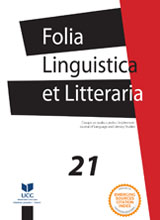CONJUNCTIVE ADVERBS AS ELEMENTS OF METADISCOURSE IN RESEARCH ARTICLES IN THE FIELD OF PSYCHOLOGY WRITTEN BY NATIVE AND NONNATIVE SPEAKERS OF ENGLISH
CONJUNCTIVE ADVERBS AS ELEMENTS OF METADISCOURSE IN RESEARCH ARTICLES IN THE FIELD OF PSYCHOLOGY WRITTEN BY NATIVE AND NONNATIVE SPEAKERS OF ENGLISH
Author(s): Vladimir FigarSubject(s): Psychology, Theoretical Linguistics, Comparative Linguistics, Evaluation research, Rhetoric
Published by: Filološki fakultet, Nikšić
Keywords: metadiscourse; academic discourse; WordSmith; conjunctive adverbs; transitions; frame markers; boosters;
Summary/Abstract: This paper aims to investigate the role of conjunctive adverbs as resources of academic metadiscourse in research articles from the field of Psychology. The research involved a small specialized corpus that included a total of 124,657 words, and it was comprised of 24 research articles written in English. Half of the articles were written by native speakers of Serbian, and the other half by native speakers of English. The materials were extracted from two leading journals in the field – Psihologija and The Journal of General Psychology. The corpus was analyzed both in quantitative and qualitative terms. Quantitative analyses involved statistical comparisons of mean densities performed via repeated measures ANOVAs and independent samples t-tests, while qualitative analysis was conducted in line with the model of metadiscourse presented in Hyland and Tse (2004), and Hyland (2005). The obtained results showed that native speakers of English used more metadiscourse resources, and did so more consistently compared to native speakers of Serbian. Additionally, conjunctive adverbs identified in the corpus performed the functions of transitions, frame markers, code glosses, and boosters.
Journal: Folia Linguistica et Litteraria
- Issue Year: 2018
- Issue No: 21
- Page Range: 7-39
- Page Count: 33
- Language: English

